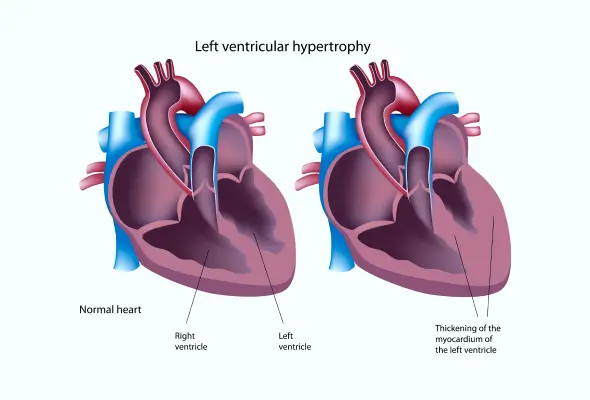-
Doctors
-
Specialities & Treatments
Centre of Excellence
Specialties
Treatments and Procedures
Hospitals & Directions HyderabadCARE Hospitals, Banjara Hills CARE Outpatient Centre, Banjara Hills CARE Hospitals, HITEC City CARE Hospitals, Nampally Gurunanak CARE Hospitals, Musheerabad CARE Hospitals Outpatient Centre, HITEC City CARE Hospitals, Malakpet
HyderabadCARE Hospitals, Banjara Hills CARE Outpatient Centre, Banjara Hills CARE Hospitals, HITEC City CARE Hospitals, Nampally Gurunanak CARE Hospitals, Musheerabad CARE Hospitals Outpatient Centre, HITEC City CARE Hospitals, Malakpet Raipur
Raipur
 Bhubaneswar
Bhubaneswar Visakhapatnam
Visakhapatnam
 Nagpur
Nagpur
 Indore
Indore
 Chh. Sambhajinagar
Chh. SambhajinagarClinics & Medical Centers
Book an AppointmentContact Us
Online Lab Reports
Book an Appointment
Consult Super-Specialist Doctors at CARE Hospitals

Left Ventricular Hypertrophy
Symptom, Causes, Diagnosis and Treatment
Left Ventricular Hypertrophy
Left ventricular hypertrophy can have an impact on people's lives. This condition, where the heart's main pumping chamber (left ventricle) thickens, is more than just a medical term – it's a serious health issue that affects many. Doctors often use an ECG to diagnose left ventricular hypertrophy, which gives crucial information about the heart's electrical activity and structure.
In this article, we'll explore the ins and outs of Left Ventricular Hypertrophy. We'll explore the causes, the symptoms to watch out for, and the available treatments.

What is Left Ventricular Hypertrophy?
Left ventricular hypertrophy is a cardiovascular condition where the walls of the left ventricle, the heart's main pumping chamber, thickens. This thickening can impact the heart's ability to pump blood effectively. The left ventricle is responsible for sending oxygen-rich blood into the aorta, which then distributes it throughout the body. When the heart has to work too hard to pump blood, the muscles in the left ventricle walls grow excessively, a process called hypertrophy. This change can lead to increased pressure within the heart, making it harder for the organ to function correctly. As a result, there may be a lack of oxygen to the heart muscle, and changes to the heart's conduction system can cause irregular heartbeats (arrhythmias).
Left Ventricular Hypertrophy Causes
Various causes can result in the development of left ventricular hypertrophy, such as:
- Hypertension: The most common is high blood pressure, which makes the heart work harder to pump blood. This extra effort leads to the thickening of the left ventricle walls.
- Aortic Valve Stenosis: Aortic valve stenosis forces the heart to exert more pressure to pump blood into the aorta.
- Genetic Disorders: Certain genetic conditions, such as hypertrophic cardiomyopathy, can also result in left ventricular hypertrophy. In this case, gene changes cause the heart muscle to thicken, even without high blood pressure.
- Excessive Workout: Intensive athletic training can lead to a condition called athlete's heart, where long-term physical stress causes the heart to grow larger.
Symptoms of Left Ventricular Hypertrophy
Heart left ventricular hypertrophy often develops gradually, and many people may not experience symptoms in the early stages. As the condition progresses, however, the strain on the heart can lead to noticeable signs, such as:
- Shortness of breath, especially when lying down
- Swelling in the legs
- Chest pain, particularly during exercise
- A sensation of rapid, fluttering, or pounding heartbeats (Heart palpitations)
- In more severe cases, patients may experience dizziness or even fainting spells
It's important to note that these symptoms can vary and depend on the severity and duration of the condition. If you're experiencing any of these left ventricular hypertrophy signs, we recommend seeking medical attention promptly for proper diagnosis and treatment.
Risk Factors
Certain factors increase the likelihood of developing left ventricular hypertrophy:
- Obesity
- Age plays a role, with older adults being more susceptible.
- Ethnicity - black individuals
- Arrhythmias
- Aortic valve stenosis
- Diabetes
- Genetic factors also contribute
Complications of Left Ventricular Hypertrophy
Left ventricular hypertrophy can lead to serious complications if left untreated, such as:
- Systolic or diastolic dysfunction - As the condition progresses, it impacts the heart's ability to pump blood efficiently. This can result in systolic or diastolic dysfunction, eventually leading to end-stage heart failure.
- Arrhythmias
- Atrial fibrillation
- Ischemic stroke
- The increased myocardial oxygen demand in eccentric hypertrophy may cause angina or ischaemic symptoms.
- Heart attack
It's crucial to address LVH promptly to prevent these severe outcomes.
Diagnosis of Left Ventricular Hypertrophy
Initially the doctor will inquire about symptoms, family history of heart disease, and risk factors (high blood pressure or diabetes).
Several tests to diagnose left ventricular hypertrophy, such as:
- Physical Assessment: Doctors may detect heart murmurs or abnormal sounds by listening with a stethoscope.
- Electrocardiography (ECG): ECG is the most readily available diagnostic test. It measures the heart's electrical activity through skin electrodes.
- Echocardiogram: An echocardiogram offers higher sensitivity and can detect other heart abnormalities. It uses ultrasound to measure various heart dimensions and calculate the left ventricular mass index.
- MRI: Cardiac MRI is the gold standard diagnostic measure to detect left ventricular hypertrophy.
Treatment for Left Ventricular Hypertrophy
The main goal of left ventricular hypertrophy treatment is to manage underlying conditions that cause this condition.
- Medication:
- Blood Pressure Medications: Doctors prescribe medicines like angiotensin receptor blockers, ACE inhibitors, or calcium channel blockers to lower blood pressure and potentially reverse the thickening of the heart muscle.
- Anti-arrhythmic Medications: Doctors prescribe anti-arrhythmic medicines to treat arrhythmias.
- Treating Underlying Conditions:
- Managing metabolic conditions, such as diabetes or obesity, can help reduce heart strain.
- Addressing sleep disorders and stress may improve heart function.
- Surgery:
- In cases where left ventricular hypertrophy is caused by aortic valve stenosis, doctors may recommend valve replacement surgery. This procedure allows for proper blood flow and can improve heart function.
- Doctors also emphasise the importance of lifestyle changes, including a heart-friendly diet and regular exercise, to complement medical treatments and reduce the risk of complications.
When to See a Doctor
- Promptly seek medical guidance if you experience symptoms that could indicate Left Ventricular Hypertrophy.
- If you have severe chest pain lasting more than a few minutes, difficulty breathing, or sudden lightheadedness, it's crucial to get emergency care immediately.
- Additionally, if you notice signs of a possible stroke, such as difficulty speaking, a sudden and severe headache, or weakness on one side of your body, don't hesitate to seek urgent medical help.
- Regular check-ups are essential to monitor your heart health if you have high blood pressure or other risk factors for left ventricular hypertrophy. Early diagnosis is key to developing an effective treatment plan for Left Ventricular Hypertrophy.
Preventions
Preventing left ventricular hypertrophy is crucial for maintaining heart health, including:
- Managing high blood pressure
- Consume a heart-healthy diet that's low in salt and animal fats but rich in fruits, vegetables, whole grains, and lean proteins.
- Regular exercise, as your doctor advises, can help reduce heart rate and blood pressure.
- Maintaining a healthy weight is also essential.
- Limiting or avoiding alcohol
- Managing stress through stress-reduction techniques like deep breathing or yoga can be beneficial.
- Quitting smoking
- Blood pressure checks at regular intervals are vital for early detection and treatment.
Conclusion
Left ventricular hypertrophy is a serious heart condition that has an impact on many people's lives. This article has looked at its causes, symptoms, risk factors, and potential complications. We've also explored how doctors diagnose and treat this condition, emphasising the importance of managing high blood pressure and making heart-healthy lifestyle changes.
Understanding the signs of left ventricular hypertrophy and knowing when to see a doctor are key to staying on top of your heart health. By taking steps to prevent this condition, such as eating well, exercising regularly, and keeping stress in check, you can help keep your heart strong and healthy. Remember, your heart health is in your hands, and small changes can improve your overall well-being.
FAQ's
1. How common is left ventricular hypertrophy?
Left ventricular hypertrophy is present in 15% to 20% of the general population. It's more prevalent in Black individuals, older adults, and those with obesity or hypertension. In untreated hypertensive patients, the prevalence ranges from 19% to 48%, increasing to 58%-77% in high-risk hypertensive patients.
2. How serious is left ventricular hypertrophy?
Left ventricular hypertrophy is a serious condition. It's a consistent predictor of cardiovascular morbidity and mortality in hypertensive patients. Once developed, it significantly increases the risk of myocardial ischaemia, heart failure, arrhythmias, and sudden death.
3. Should I worry about left ventricular hypertrophy?
Doctors advise taking left ventricular hypertrophy seriously. It puts patients at high risk for cardiovascular events and mortality. However, the condition can often be controlled or even reversed with proper management, including lifestyle changes and medical treatment.
4. Does left ventricular hypertrophy need surgery?
Surgery isn't always necessary for left ventricular hypertrophy. Treatment depends on the underlying cause. In cases of aortic stenosis, aortic valve replacement may be recommended, especially if there is rapidly progressing stenosis with left ventricular dysfunction.
5. How long does it take to recover from LVH?
Recovery time from left ventricular hypertrophy varies. Various studies showed that after about 38 months of therapy, 90.5% of subjects achieved complete regression of LVH. It's a gradual process that requires consistent treatment and lifestyle changes.
6. Can LVH be reduced?
Yes, LVH can be reduced. Antihypertensive therapies that induce regression of LVH have been shown to decrease rates of major adverse cardiovascular events and enhance survival. Lifestyle modifications, including reduced salt intake and regular exercise, are crucial in managing LVH.
7. Can high cholesterol cause left ventricular hypertrophy?
While high blood pressure is the primary cause of left ventricular hypertrophy, some studies suggest a relationship between cholesterol levels and LVH. However, more research is needed to establish a causal link between high cholesterol and left ventricular hypertrophy.
Still Have a Question?




